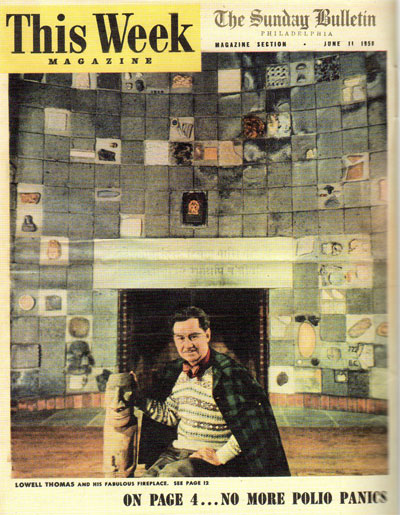
Courtesy of Urban Archives, Temple University. Used with permission.
LOWELL JACKSON THOMAS (1892–1981) was the voice of the news in the U.S. for almost half a century, hosting CBS radio’s evening news from 1930 to 1976. A pioneer in radio journalism, newsreel films, television news, and 3-D movies, Thomas traveled the world to report news with the ambition “to know more about this globe than anyone else.”
A foreign correspondent during both World Wars and the author of 55 books on his travel adventures, Lowell Thomas also served on the Penn Museum’s Board of Managers from 1938 to 1946. Although there is little correspondence in the Archives concerning his involvement during this time, in 1939 he lent his voice to narrate a motion picture entitled “Ancient Earth.” Made to promote the Museum’s archaeological work and educational mission, this 30-minute film shows the excavation, conservation, and exhibition of the “Grave of the Warrior” from Iran’s Tepe Hissar.
Happy to help the Museum, Thomas refused to charge a fee for his work, asking instead for a favor. For a number of years Thomas had nurtured the idea of building a “fireplace made up of stones telling the History of Man.” Begun in the late 1930s at a community center in Quaker Hill, Pawling, New York, his “History of Civilization” fireplace consisted of 220 cement blocks one foot square surrounding a sandstone lintel inscribed with a Sanskrit proverb. Each block was to be replaced eventually with a stone from a famous building or historic site around the world; “on one side of the fireplace there were places for the work of prehistoric man. On the other side the lower rows were for the story of known man from the dim dawn of history 5,000 years ago. Way up at the top I was leaving one row for the fun of future generations.”
Thomas collected stones on his travels but also received many from people who heard him discuss his fireplace on the radio. He claimed to own pieces from the Dome of the Rock in Jerusalem, the Taj Mahal in India, the Egyptian pyramids, New York’s Empire State Building, and even from the subterranean bunker where Hitler ended his life.
The favor he asked of Museum Director Horace Jayne was whether the Museum could bake a brick for his fireplace from the dirt recovered from its excavations at Ur in modern Iraq. Jayne agreed, but apparently the clay resisted proper firing and so the Museum eventually gave Thomas an actual ancient brick from Ur, “a brick bearing the stamped inscription of King Ishme Dagon of Ur of the Chaldees. It has a place of honor in the bottom row on the right-hand side.”
